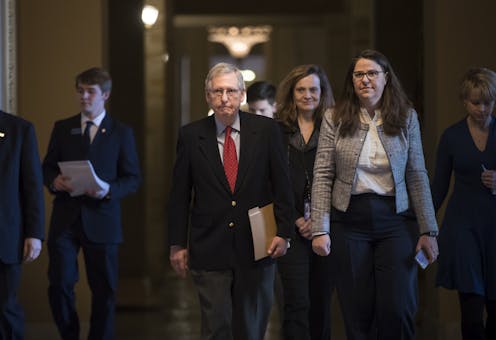Another continuing resolution won't solve the real problem within the Republican Party
The party's promise to be all things to all people has hit a wall.

Republicans can’t agree on a budget.
That lack of agreement has made it necessary for Congress to pass a series of continuing resolutions to keep the government open.
There’s no budget agreement because factions within the GOP hold contradictory policy positions on almost every issue. James Madison, an author of the Federalist Papers might have framed the problem this way: The party draws on votes from – and is accountable to – diverse groups of citizens with conflicting interests. That conflict within the Republicans’ voting base means that any policy they propose would hurt at least some of the members’ key constituents.
In an era of hyperaccountability, swift electoral punishment from any negatively impacted constituency is all but inevitable. Every vote and utterance by a political incumbent is scrutinized on Facebook and Twitter. The personal electoral costs of following the party line are prohibitive for enough to break down compromise within the party and preclude any significant policy change.
The recent tax bill was a happy exception for the Republicans. It lowered – or, at least, did not raise – federal taxes for practically everyone who mattered to Republicans. In essence, it handed out money to majorities in all categories of supporters without specifying who would bear the costs.
Now with the budget, the time has come to clarify – to agree on where and for whom to cut expenditures. It is no surprise that there is about as much internal consensus within the GOP as they had on cutting expenditures on Obamacare – none. It is the practical reality of unified Democratic opposition that in order to legislate, the Republicans would have to agree on something.
What once was, arguably, a party united by fiscal responsibility and economic and social laissez-faire is now committed to a wide variety of causes. Disparities among constituencies that vote Republican across the country have been growing since the mid-1990s. Because this lack of unity is electoral in nature, the inability to formulate policies will remain a problem for the long run.
When key decision-makers disagree, the result is that they cannot change the policy status quo. Republican failure to move the policy status quo on health care, or to reach a consensus on the budget is caused not by poor Republican strategies. It is caused by contradictions within Republican rank-and-file members because of who their voters are and what they want.
The authors do not work for, consult, own shares in or receive funding from any company or organisation that would benefit from this article, and have disclosed no relevant affiliations beyond their academic appointment.
Read These Next
Former Harvard president Summers’ soft landing after Epstein revelations is case study of economics’
Despite repeated calls for the university to revoke his tenure, the economist held onto his teaching…
There aren’t enough geriatricians – here’s how older adults can still get the right care
A few simple strategies can help older adults convey their needs to their health care provider.
How to prevent elections from being stolen − lessons from around the world for the US
As President Trump and other Republicans cast doubt on the legitimacy of the US electoral system, other…





